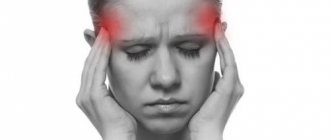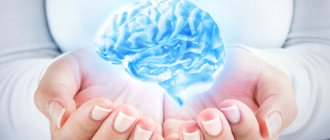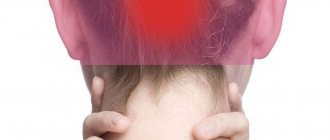Sign up
Price
Our doctors
Headaches during pregnancy occur quite often, and, as a rule, they are not dangerous to health.
Noise, stress, fatigue, too little outdoor exercise, lack of sleep, as well as too much sleep (especially in the second half of pregnancy), insufficient fluid intake and poor nutrition are the main culprits of headaches during pregnancy. Pain that occurs in early pregnancy can be associated with hormonal changes. An increase in the synthesis of estrogen and progesterone, necessary for the development of a child, causes water retention in the tissues. Swelling occurs, including in the brain tissue, where nerve receptors respond with pain to increased pressure. Fortunately, this is not dangerous for the mother and fetus.
TREATMENT OF HEADACHES DURING PREGNANCY AND BREASTFEEDING IS AVAILABLE AT: BRANCHES
Treatment of headaches during pregnancy and breastfeeding in the Primorsky region
Address: St. Petersburg , Primorsky district, st. Repisheva, 13
Treatment of headaches during pregnancy and breastfeeding in the Petrograd region
Address: St. Petersburg , Petrogradsky district, st. Lenina, 5
Treatment of headaches during pregnancy and breastfeeding in Vsevolozhsk
Address: Vsevolozhsk , Oktyabrsky Prospekt, 96 A
Literature:
- Treatment of headaches without drugs [Text]: monograph / [D. D. Molokov and others] ; Ministry of Health of the Russian Federation, State Budgetary Educational Institution of Further Professional Education "Irkutsk State. honey. acad. postgraduate education." - Irkutsk: IGMAPO, 2014. - 123 p.
- Headache. Issues of diagnosis, therapy, prevention [Text]: reference guide for general practitioners (in 2 parts) / O. A. Morozova; Ministry of Health of the Chuvash Republic, State. autonomous institution of the Chuvash Republic additional. prof. Education "Institute for advanced training of doctors". — Cheboksary: GAU DPO “IUV”, 2021.
- Headache: what to do? / Alexandra Vasilyeva. - St. Petersburg. : Nev. prosp., 2002. - 123 p.
The text was checked by expert doctors: Head of the socio-psychological service of the Alkoklinik MC, psychologist Yu.P. Baranova, L.A. Serova, a psychiatrist-narcologist.
CAN'T FIND THE ANSWER?
Consult a specialist
Or call: +7 (495) 798-30-80
Call! We work around the clock!
Prevention of headaches during pregnancy
First of all, you need to relax. In fact, there are more important things than the mood of the boss, the color of the wallpaper in the room or the order in the closet. Every day you should provide yourself with 8-10 hours of sleep. It is necessary to remember about walks and regular meals, because hunger is manifested not only by sensations in the stomach, but also by headaches. Your diet should contain sources of magnesium (buckwheat, flour, pumpkin seeds, cocoa, bananas), since a deficiency of this element often causes tension headaches. Such dull and not very severe pain can persist for a week.
Even slight dehydration can cause similar problems, so don't forget to drink. It is worth remembering that not all drinks are equally good during pregnancy. Coffee, tea, or thick juices may cause the body to lose fluid or interfere with its absorption. The best option is pure non-carbonated water with a low content of minerals (up to 500 mg of elements per liter), which will not put too much strain on the kidneys, which bear a double load during pregnancy.
It is necessary to remember about a comfortable bed, because the spine can also be the cause of headaches. The mattress should not be too hard, since on a hard base your bones and muscles are constantly under tension and do not rest, and not too soft, since in this case the load on the spine will be uneven.
Dental treatment
Some young mothers are afraid to go for dental treatment because they read somewhere that anesthesia can have a bad effect on the quality of breast milk. In reality, this is not so: the doctor gives a local injection, which has a short-term effect and is quickly eliminated from the body, and therefore does not cause any harm to the baby’s health? As stated in the online magazine “Doctor Zubov”. So it is possible and necessary to treat teeth with pain relief during lactation. It is better to clarify in advance which drug will be administered to you, and inform the dentist about breastfeeding. In this case, the doctor will select the optimal remedy that will not only provide excellent pain relief during dental treatment, but will also be eliminated from the body as quickly as possible.
Headache while breastfeeding
The occurrence of headaches during lactation and breastfeeding is often associated with chronic lack of sleep and fatigue of young mothers. These may include tension headaches and migraine pain. By organizing your day and taking frequent rest, such pains go away on their own.
However, for more serious reasons (hypertension, head injuries, infectious diseases), it is necessary to consult a doctor who can examine you for other diseases, such as intercostal neuralgia or sciatica.
Prohibited drugs
All of these pills are almost certainly in your medicine cabinet. But they are strictly prohibited for women who are breastfeeding. This list included:
- Analgin. In most countries, this drug is generally prohibited for use (not only by nursing women), as it contains a substance that provokes the development of agranulocytosis. If it gets into breast milk, it has an extremely negative effect on the functioning of the baby’s kidneys and circulatory system. Analgin is part of Baralgin, Tempalgin, Spazmalgon, Pentalgin, Spazgan. Approved for use only in the most extreme cases, at high temperatures that are not affected by other medications. Then an intramuscular injection of analgin with diphenhydramine and papaverine is given. However, only a doctor can prescribe such radical methods!
- "Nimesil" ("Nise", "Nimid" and other drugs based on nimesulide). Has an almost instant pain relieving effect. But due to the lack of a sufficient number of clinical studies, it is prohibited for use by pregnant and lactating women, as well as children under 12 years of age.
- Acetylsalicylic acid (aspirin and citramone). It negatively affects the functioning of the gastrointestinal tract of the baby and contributes to disruption of the kidneys and hematopoietic system.
Treatment of headaches during pregnancy and breastfeeding
The intake and dosage of pain medications should be discussed with your gynecologist. Due to the fact that many painkillers (including analgin and aspirin) have a harmful effect on the unborn child (teratogenic effect), restrictions on the use of medications are introduced during pregnancy. These restrictions remain in case of headaches and during breastfeeding for the reason described above, since all medications pass into milk.
Some of the mild recommended painkillers are paracetamol-based medications.
However, we also emphasize that before treating a headache, it is necessary to identify its cause, so that the headache does not turn out to be a symptom of a tumor in the brain.
In our multidisciplinary clinic you can undergo examination and consult with competent doctors.
List of approved drugs
Now a woman can turn to the Internet for help: just enter the appropriate name of the medicine into a search engine, and several sites will tell you whether it is allowed to be taken during pregnancy or lactation. For example, there is a universal reference book e-lactation. If we talk about painkillers, which are usually used for severe headaches and toothaches, as well as during extremely painful periods, here is a complete list of tablets that you can take, as well as intramuscular, external and rectal agents:
- Preparations containing paracetamol reduce temperature and pain, and also help to subside inflammatory processes. The main part leaves the body a couple of hours after administration.
- Ibuprofen-based drugs work for toothache, discomfort in joints and muscles. Suppositories and tablets relieve fever and help cope with the symptoms of ARVI. When using medications, less than one percent of the active substance gets into the milk - this is completely safe for the baby.
- Of the antispasmodics, that is, drugs that relax smooth muscles and relieve spasms, no-spa is allowed during breastfeeding. The drug eliminates discomfort in the intestines and can be used for stomach cramps or renal colic.
- If a nursing mother needs to treat caries or remove a tooth, injections of ultracaine or lidocaine can be used to anesthetize these processes. They quickly provide an analgesic effect and are then just as quickly eliminated from the body.
- In case of particularly severe pain syndrome, it is allowed to take “Ketorol” (also known under the names “Ketanov” and “Ketalgin”). This non-steroidal anti-inflammatory drug quickly provides pain relief. Used for migraines and menstrual pain. Two hours after administration it passes into breast milk, but its concentration is so low that even American and European doctors allow Ketorol to be taken by nursing mothers.
- Diclofenac. If the pain appears as a result of a bruise, sprain or other “sports” injury, doctors suggest using special anti-inflammatory pain-relieving ointments. The substance does not affect the quality and quantity of milk in any way and is quickly eliminated from the body. Diclofenac is contraindicated in people with high blood pressure or peptic ulcers.
Cost of treatment for headaches during pregnancy and breastfeeding:
| Services list | Price in rubles | |
| Saint Petersburg | Vsevolozhsk | |
| Initial appointment with a 1st level neurologist | 1850 | 1700 |
| Repeated appointment with a 1st level neurologist | 1650 | 1500 |
| Initial appointment with a 2nd stage neurologist | 2100 | — |
| Repeated appointment with a 2nd stage neurologist | 1900 | — |
| Initial appointment with neurologist Kolyada A.A. | 3200 | — |
| Repeated appointment with neurologist Kolyada A.A. | 2900 | — |
| Initial appointment with a neurologist Eroshina E.S./Irishina Yu.A./Tsinzerling N.V. | 4000 | 4000 |
| Repeated appointment with a neurologist Eroshina E.S./Irishina Yu.A./Tsinzerling N.V. | 3500 | 3500 |
| Initial appointment with neurosurgeon A.I. Kholyavin | 3300 | — |
| Repeated appointment with neurosurgeon A.I. Kholyavin | 2900 | — |
| Neurologist's report for reference | 700 | 700 |
| MANIPULATION | ||
| Piriformis muscle block | 2000 | 2000 |
| Occipital nerve block | 1800 | 1800 |
| Carpal tunnel block | 2500 | 2500 |
| Block of the sacroiliac joints | 2700 | 2700 |
| Suprascapular nerve block | 1800 | 1800 |
| Botulinum therapy | 5300 | 5300 |
| Botulinum therapy for bruxism and chronic facial pain | 18000 | — |
| Infusion relief of acute back pain syndrome | 1750 | 1750 |
| Plasmolifting (1 procedure) | 3100 | 2800 |
| Transcranial polarization in Parkinson's disease (30 min) | 1800 | — |
| Pharmacopuncture | from 1500 | from 1500 |
| HEADACHE TREATMENT | ||
| Botulinum therapy for chronic migraine | 35000 25900 | 35000 25900 |
| Targeted treatment of migraine (1 session) | 17900 | 17900 |
How constipation manifests itself
Constipation is defined as difficult, unsystematic or incomplete bowel movements, as well as the inability to go to the toilet for more than a day and a half in a row. The following signs indicate constipation:
- hard, dry, segmented stool;
- decrease in daily stool volume;
- decreased frequency of bowel movements (less than three times a week);
- a feeling of pressure in the rectum during bowel movements.
Constipation is often accompanied by a feeling of heaviness in the stomach and flatulence. A woman often experiences pain in the intestinal area.
When breastfeeding, spastic and atonic constipation may occur.
- Spastic . They occur against a background of nervous tension, stress, fear, or lack of sleep. Due to the nervous shock a woman experiences, the intestinal muscles contract and impede the passage of feces. Spastic constipation is characterized by frequent false urges to defecate. The stool is dry and scanty. Bowel movements are often painful.
- Atonic . Associated with inhibition of intestinal muscle tone. Insufficient peristalsis slows down the speed of stool movement. Stool with atonic constipation has a different consistency: hard at the very beginning of defecation and liquid at the end.
Problems with bowel movements after childbirth are considered normal. In most cases, constipation goes away on its own within a few days. If constipation becomes chronic, causes severe discomfort and is accompanied by unpleasant sensations, it is necessary to identify the cause of its occurrence.










